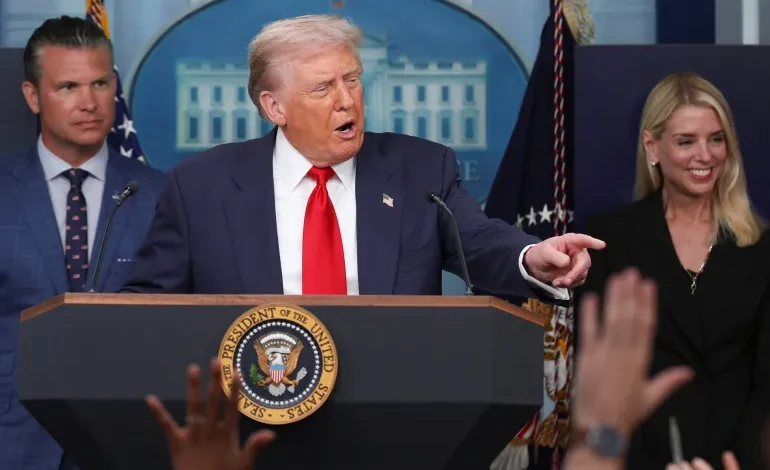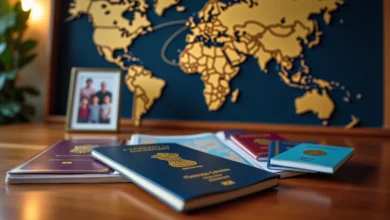
Trump Orders Massive Review of 55M US Visa Holders
The Trump administration has started a detailed review of visas belonging to more than 55 million foreign nationals. This review aims to find potential violations that could result in deportation. Officials will check all valid US visa holders for infractions. These range from simple overstays to serious issues like terrorist activities.
The administration has substantially stepped up deportation efforts since President Trump took office. These efforts now target not just undocumented migrants but also people with student visas and visitor exchange programs. The State Department’s visa revocations have more than doubled compared to last year. Student visa cancelations have jumped nearly four times. The expanded vetting process now looks at social media accounts of future students and visitors. Officials search for any content showing hostility toward American citizens, culture, government, or founding principles.
This detailed review impacts 12.8 million green-card holders and 3.6 million people on temporary visas. These include work visas of all types, such as H1B visas that skilled foreign workers commonly use. The State Department gave out about 11 million temporary visas during the 2024 fiscal year. All these visas now face improved scrutiny under this initiative.
Trump Orders Review of 55 Million Visa Holders
Image Source: WBAL-TV
President Trump ordered the State Department to create a groundbreaking “continuous vetting” system that affects all 55 million foreign nationals who hold valid U.S. visas. This sweeping change expands beyond the initial student visa holder reviews to now cover tourists, workers and every other visa category.
The new system allows officials to monitor specific violations that could lead to visa cancelations. Officials track visa overstays, criminal activity, public safety threats, terrorist activities, and any support given to terrorist organizations. Visa holders currently outside U.S. borders cannot challenge revocation decisions in court if they receive proper notification.
Officials now scrutinize social media accounts, law enforcement records, and immigration histories of visa holders both in their home countries and the United States. The State Department reports this enhanced monitoring has already doubled visa revocations compared to last year’s numbers.
Nationals from countries like India, China, and Iran face extra scrutiny. The administration has made it clear that people with legal permission to stay might suddenly lose their status through this monitoring system.
State Department Expands Vetting Criteria

Image Source: U.S. Embassy in the Dominican Republic
The State Department now requires all student and exchange visitor visa applicants to make their social media accounts “public” to get a full picture of their background. This new rule expands the screening process that’s over 4 years old, which required visa applicants to share their social media activity from the previous five years.
U.S. officials have canceled more than 6,000 international student visas because students broke laws or stayed longer than allowed. All but one of these cases involved legal violations – about 4,000 students faced charges like assault, drunk driving, and burglary. The remaining 200-300 visas were canceled due to “terrorism done under INA 3B”.
Starting June 18, 2025, consular officers will need to perform detailed checks on all FMJ applicants. They will look for content that indicates “hostile attitudes toward citizens, culture, government, institutions, or founding principles of the United States”. The screening process also checks if applicants support terrorism or engage in antisemitic harassment or violence.
Secretary of State Marco Rubio told lawmakers that “thousands” of student visas had been canceled. Notwithstanding that, these 6,000 canceled visas make up a tiny portion of the 1.1 million international students who attended U.S. colleges in the 2023-2024 academic year.
Visa processing will take longer even though appointments have resumed. Officers must “take the time necessary” to complete proper background checks.
Truck Driver Visas Suspended Amid Safety Concerns
Image Source: Times of India
Secretary of State Marco Rubio announced an immediate halt to all work visas for commercial truck drivers because of safety concerns on American roads. “The increasing number of foreign drivers operating large tractor-trailer trucks on U.S. roads is endangering American lives and undercutting the livelihoods of American truckers,” Rubio stated on social media platform X.
A deadly crash in Florida earlier this month prompted this decision after Harjinder Singh, an undocumented truck driver, allegedly caused an accident that killed three people. Officials found Singh had failed an English language proficiency assessment. He correctly answered just two of twelve verbal questions and identified only one of four highway signs.
A State Department spokesperson made it clear that the suspension “applies to all nationalities and is not directed at any specific country”. This action lines up with the administration’s broader efforts to enforce English proficiency standards for commercial drivers.
Immigrant drivers make up about 18% of truck drivers in the United States. The number of foreign-born drivers has more than doubled from about 316,000 to over 720,000 between 2000 and 2021.
The American Trucking Association backed the pause and advocated for “serious scrutiny” of non-domiciled commercial driver’s licenses. But this decision comes at a time when the industry faces a shortage of roughly 60,000 truck drivers, which raises questions about potential supply chain effects.
This detailed visa review shows a major change in U.S. immigration enforcement policy. The government has expanded its efforts into an unprecedented examination that affects millions of legal foreign nationals. Valid documentation holders now face possible status changes as officials inspect their social media activity and minor infractions.
These sweeping changes reach beyond individual visa holders. Student enrollment at universities will likely suffer as visa revocations increase. The trucking industry faces more challenges on top of its existing 60,000-driver shortage due to suspended commercial driver visas.
State Department’s new vetting procedures show a fundamental change in managing foreign visitors. Consular officers must balance security screening with processing speed. They have received instructions to spend whatever time they need for proper evaluation.
Recent data shows 6,000 revoked student visas – a small fraction of the 1.1 million international students in American schools. Yet this change carries broader meaning. National security and domestic job protection now take priority over international exchange and labor market access.
Without doubt, America’s relationship with foreign visitors, workers, and students will transform as this review continues. Time will reveal if this strict approach meets its security goals while managing economic and diplomatic fallout.






